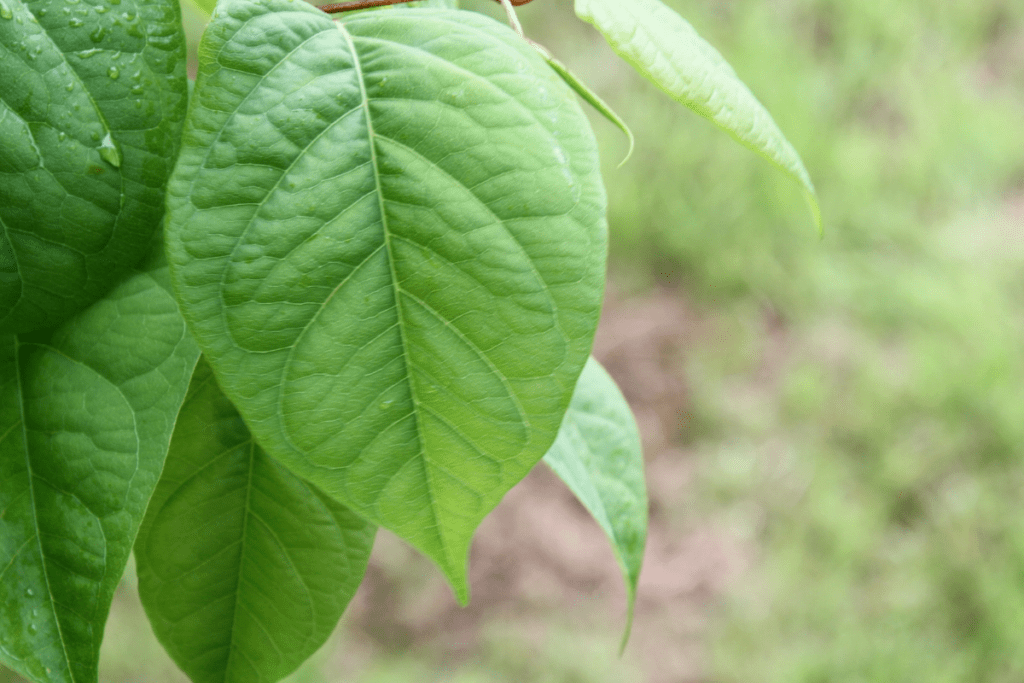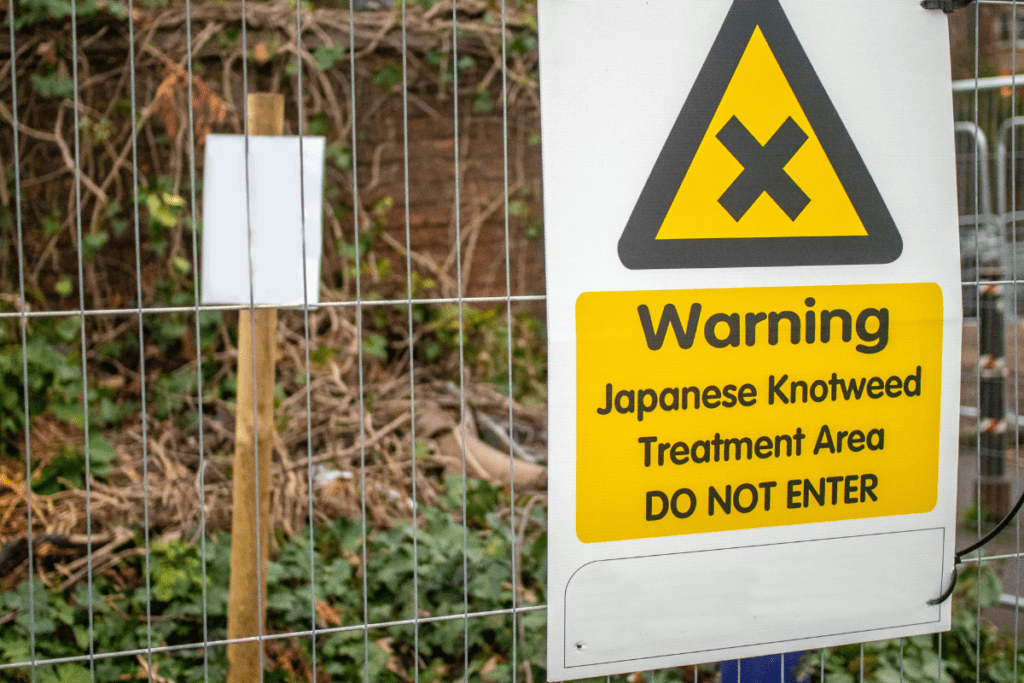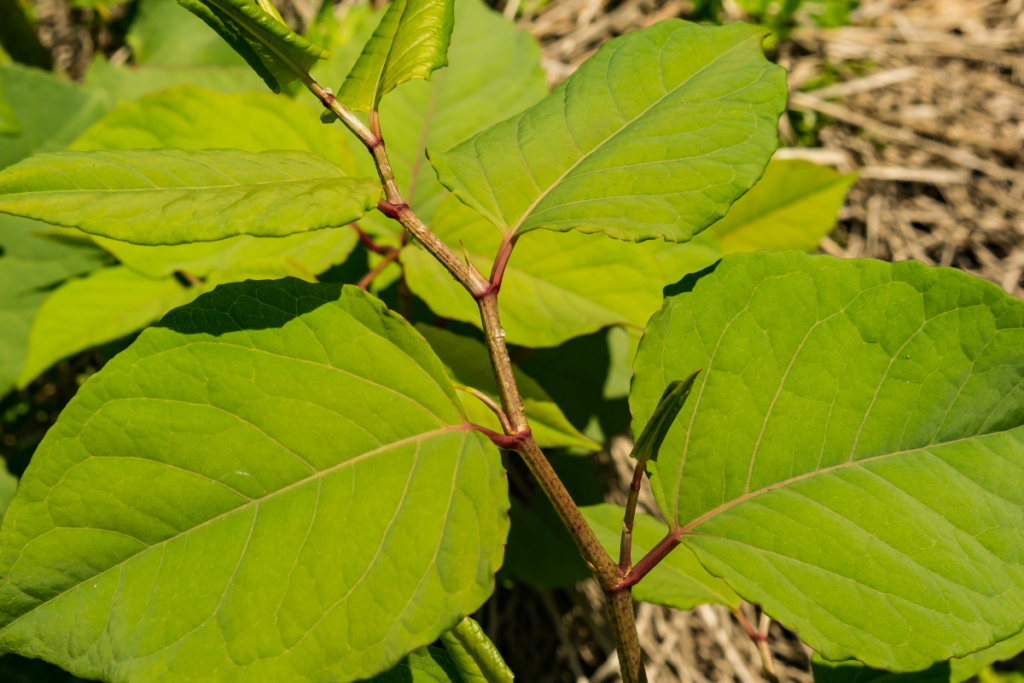Japanese knotweed, scientifically known as Fallopia japonica or Polygonum cuspidatum, is a herbaceous perennial plant native to East Asia. It was used for lots of things from medicine to stabilising streambanks to ornamental purposes, however it’s since become known as more of an invasive species. Japanese knotweed can grow quickly and as high as 11 feet, which means managing its growth and spread is important. Our guide to Japanese knotweed covers more about what it is, as well as why it’s problematic and what you can do about it.
What is Japanese knotweed?

Japanese knotweed is a bamboo-like plant, which grows rapidly. Initially introduced into the UK in the 19th century, the plant was popular with landscapers and gardeners due to its ability to form thick screens. The swift growth of Japanese knotweed quickly became a problem because it started to out-compete native plant species.
More recently, the mention of Japanese knotweed has made buyers and sellers nervous. Before new guidelines were proposed by the Royal Institution of Chartered Surveyors (RICS), sales stalled and were even derailed by the presence of the plant. Lenders have rejected applications for loans on properties affected by Japanese knotweed and many people are fearful of trying to buy or sell if there is evidence of the plant on the plot.
It is estimated that there are approximately 1.45 million homes in the UK that have Japanese knotweed.
Why is Japanese knotweed so bad?
There is a risk of property damage linked to Japanese knotweed, but the RICS suggests that many people have concerns about the plant as a result of fear caused by misinformation. In the worst-case scenario, knotweed can affect:
- drainage systems
- patios, pathways and driveways
- boundary walls
- gardens
- outdoor structures and outbuildings
- conservatories
The RICS states that severe damage is very rare, and in most cases, it is possible to prevent further damage through remediation treatment. Seeking expert help can protect properties and prevent buyers and vendors from losing out.
Should you remove Japanese knotweed?
Legally speaking, you aren’t required to remove Japanese knotweed from your land unless it’s causing a nuisance. However, it’s worth noting that you can face prosecution if you cause it to spread into the wild.
For small clumps, the task is more manageable. These can often be tackled by the home gardener either by digging them up or spraying them with a weedkiller. Yet, it’s essential to be aware of its notorious reputation for being difficult to eradicate entirely.
If you’re dealing with a larger infestation, it’s often recommended to hire a professional company. Their expertise ensures the plant is properly dealt with, preventing further spreading.
What not to do with Japanese knotweed?
There are some actions you should avoid when tackling this weed. These include:
- Do not flail or strim: This can spread fragments of the plant, leading to new growth elsewhere.
- Avoid dumping cuttings: Even small pieces of the plant can regenerate if they’re discarded inappropriately.
- Resist the urge to compost it: Japanese knotweed will survive most composting processes, potentially contaminating your compost.
- Do not rely solely on manual removal: While you can dig out the plant, its extensive root system means that you’re likely to miss some fragments, leading to regrowth.
- Be cautious with herbicides: While they can be effective, using them requires careful timing and multiple applications. Always follow label instructions.
- Avoid spreading soil: Soil from an area infested with Japanese knotweed can contain rhizomes. Ensure you don’t move it to unaffected parts of your garden or other locations.
- Do not underestimate its resilience: Even if you think you’ve successfully removed the plant, monitor the area for regrowth and be prepared for long-term management.
Understanding these pitfalls can help you approach Japanese knotweed management more effectively and prevent its spread further.
How do RICS guidelines on Japanese knotweed affect buyers and sellers?

In June 2021, the RICS published a consultation on new guidelines to help buyers and provide reassurance for lenders to facilitate seamless sales of properties affected by Japanese knotweed. Prior to the release of new advice, the detection of Japanese knotweed could delay, disrupt or even put a stop to property sales. Surveys that flag Japanese knotweed can cause panic among buyers and make sellers feel anxious, causing sales to fall through. The RICS wanted to provide clarity for both buyers and lenders and help to reduce the impact of misinformation.
The RICS worked with DEFRA (Department for Environment, Food and Rural Affairs) and the HCLG (Ministry of Housing, Communities and Local Government) Select Committee to create a new framework, which outlines how sales can go ahead without complications in cases where Japanese knotweed is identified.
New guidelines set out a simple, accessible route map for surveyors to follow when providing an initial assessment and advice for mortgage lenders. The framework also provides guidance for a new classification system, which would flag the most severe infestations.
The RICS framework seeks to provide reassurance for lenders and advice for surveyors so that Japanese Knotweed does not derail sales or cause major disruptions when identified during a regular valuation.
The author of the new guidelines, Philip Santo, said,
“Creating confidence and awareness that knotweed isn’t a death sentence for home sales is a key principle behind this guidance– it’s certainly not the ‘bogey plant’ that some make it out to be.” “In most instances the weed can be remediated with effective treatment– so it’s critical that all those involved in the home buying and selling process have access to unbiased, factual information, that sets out when they need to obtain reputable remediation services.” (source)
How does Japanese knotweed affect property value?
Japanese knotweed can impact property values, as well as making homes less appealing to buyers. The extent of devaluation will depend on the magnitude and severity of the issue. Effective management and remediation provided by experts can help to rectify problems and prevent further damage. If a surveyor values a property that is affected either indirectly (if a neighbouring property has an infestation) or directly by Japanese knotweed, they will take the cost of treatment and repairs into consideration in the same way as other defects that may be flagged during the survey.
In some cases, there may be a Japanese knotweed infestation, but the plant may not have caused damage to the property. In this case, the cost of treatment would be the sole issue and valuers would not have to consider the potential expenses of repairing damaged structures. It may be possible that the value of the property would not alter as a result of the presence of Japanese knotweed that had not caused any damage to the house or garden.
Is it wise to buy a house with Japanese knotweed?
The primary aim of new RICS guidance is to provide buyers and lenders with confidence that property sales can go ahead in cases where houses are impacted by Japanese knotweed. In the past, property values have been reduced and people have been anxious about buying homes that have an infestation, which may have resulted from misinformation or fears over the potential impact of the plant. It is possible for Japanese Knotweed to cause damage to properties, particularly outbuildings, drains and external structures, but in most cases, it is possible to seek expert help to remedy the issue. The new guidelines seek to put a stop to buyers losing out on their dream home due to the presence of Japanese knotweed.
For buyers who are worried about Japanese knotweed, surveys can provide an insight into the scale and severity of the problem and the potential cost of treatment. In some cases, where there are signs of damage, the cost of repairs will need to be taken into account alongside the cost of treatment. Confronting the problem is the best course of action, as some lenders will only approve a mortgage if there is a treatment plan in place.
Japanese knotweed is a strong, invasive, bamboo-like plant, which spreads rapidly. In recent years, there has been a lot of talk about Japanese knotweed and the mere mention of the words is sufficient to make buyers and sellers anxious. The RICS is issuing new guidance to try to put a stop to delays and derailments caused by the presence of the plant. It is possible for Japanese knotweed to damage properties, but in the majority of cases, expert treatment can provide a solution.
If you’re worried about the presence of Japanese knotweed in your property you can obtain a RICS building survey. RICS Chartered Surveyors are trained to spot signs of Japanese knotweed and other defects, such as damp or asbestos, and can advise accordingly.




